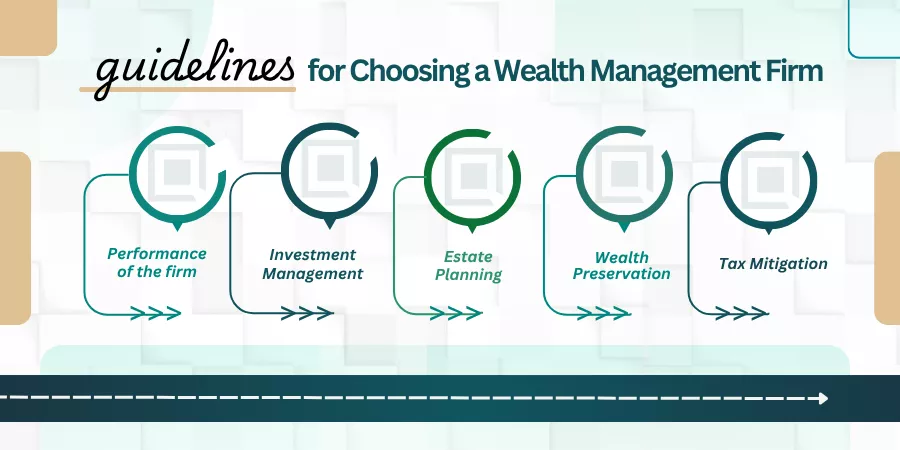Every business owner works hard to grow wealth and embrace personal financial goals. They are mindful of the strategic financial planning and wise management of their assets. But as your wealth increases, the challenges of managing it also rise.
Hiring a wealth management firm is a big decision, but the right one can help you avoid costly mistakes. That’s why many people frequently ask: how to pick a wealth management firm that can help making the most of their wealth?
This article presents a valuable insight to choose the right financial advisor who could help you improve your financial situation.
How Does a Wealth Management Firm Work?
Wealth management is a wide-ranging financial service one can benefit from. This is a holistic term that ensures your wealth is in safe hands. That is because it takes into account all the dimensions of your financial life instead of considering only one. It focuses on a person’s financial circumstances, needs, and objectives.
Because of its comprehensive nature, wealth management firms provide all-inclusive services to meet individual client’s requirements.
Here’s a breakdown of some common wealth management services that can go in your best interes:
- Investment management
- Financial planning
- Estate planning & wealth transfer
- Retirement planning
- Tax management and minimization
- Asset management
- Insurance planning
- Risk management
- Education fund planning
- Net worth determination and more
Of course, to pick that type of exhaustive service, you are likely to pay costly fees. However, for many capitalists, it is still worth it, as managing all these aspects on your own can be a daunting task.
Why You Need Private Wealth Management Services
Wealth managers usually work with wealthy individuals to maximize and protect their wealth. However, a broader range of people can take advantage of their detailed services.
Here are some factors that make it essential for you to hire a wealth manager:
- You possess a huge wealth and inheritance and think about the best options to expand and preserve your resources.
- You are a high-net-worth individual (HNWI) and looking for an expert for holistic financial and tax planning.
- You are a cross-border worker and want to streamline your finances and master intricate tax situations.
- You are a company founder and seek the services of a finance expert to invest in business assets.
- You also need a wealth manager to plan your legacy and structure your assets in a tax-efficient manner.
How to Choose a Wealth Management Firm
Connecting with a wealth management firm will be one of the most crucial financial decisions you will ever make. This important decision needs a strong attention to detail as you will pay a large percentage of your earnings to the organization for this level of service.
Your wealth needs to last. As such, your wealth advisor should illustrate what wealth management firms offer, how they can protect and multiply your capital over many generations, both in good and bad times.
So, it is essential to research an institution’s reputation, history, and structure to have a recap of its track record of wealth protection. Remember, past performance of different firms is not indicative of future results, but a strong, long-term history of growing and protecting clients’ wealth is worthwhile.
Here are a few tips for choosing a wealth management company with specific services to reach your financial goals:

Performance of a Wealth Management Firm
It will be good to know about your private wealth manager’s short and long term performance during an interview. Be sure to have an overview of the firm’s reputation, firm’s fee, particular work with clients, and the portfolio that exactly aligns with your financial circumstances.
For example, when evaluating performance history, you’ll often see disclaimers like “Past performance does not guarantee future results.” – a true statement.
Next, you should dive deeper to know how the wealth manager’s investment philosophy corresponds with your financial goals.
For example, if you are interviewing a private wealth manager who relies on long term investing, then it is recommended to analyze performance over various aspects of economic cycles.
Also, ask about the right timing of investment, and request to present the performance as a proxy.
Eventually, you should confirm returns are net of fees, gross of fees, or gross of some fees, like an advisory fee, and net of others, like mutual funds with embedded expense ratios.
Investment Management Services
One of the key features of a wealth management firm is specialization in investment management. Get in touch with a company that exhibits a strong investment portfolio, discipline, and process to handle your investments and preserve your wealth.
They must show clear investment strategies that align with your financial goals, risk tolerance, and understanding all the factors impacting your financial situation.
Moreover, it is significant to seek an investment manager who could cater a diverse range of investment options – both traditional and alternative. A highly competent portfolio is desirable to grow your wealth, mitigate risks, and secure financial future.
Estate Planning
Estate planning ensures your assets under management are passed on according to your wishes whether to family or charitable organizations.
Best wealth management firms may offer an array of estate planning techniques and one firm that is in touch with estate planning attorneys can deliver the professional expertise and drafting of documents.
An estate plan generally includes a trust, will, and other legal documents. The estate plan should also be evaluated regularly and updated to mirror modifications in your personal goals and financial situation. Your wealth management firm should be proactive in this updating process to make your financial life easier.
Wealth Preservation
Wealth preservation is the fundamental element of any extensive financial plan. Unexpected events, such as economic downturns or lawsuits can significantly impact your wealth.
Your wealth managers typically comprehend the significance of protecting your wealth. First, they should have profound awareness of your financial situation, particular investment, and many of the common risks.
Second, your wealth managers work closely with legal and insurance experts to recognize in-depth risk management solutions, involving insurance coverage for your business and personal assets.
Tax Mitigation
Taxes can also significantly impact your wealth. Your chosen firm should have a comprehensive understanding of your situation and work with a CPA who is proficient in the complexities of the tax code.
They should support your financial goals and consider after-tax results in their endorsements. Strategies like tax loss harvesting, tax-efficient investment vehicles, and estate planning techniques may prove fruitful for your financial needs and make you feel confident.
The Bottom Line
In conclusion, having an extensive knowledge of how to pick a wealth management firm is crucial for any business owner. Search for the best firm that bears qualities like a proactive culture of relationship management, expertise in tax mitigation, and a strong process and discipline for investment management.
Pairing with the right wealth management firm can help you decide your financial objectives and set up a strong framework for your future success!
FAQs

Q1. What Are Important Questions to ask for Wealth Management?
A: Here are some key questions to ask for wealth management:
What do you like to get with your money? What is the significance for you about being financially independent? What is important to you about money? Is there anything more important than that value?
Q2. What is the biggest challenge the wealth management industry is facing today?
A: One of the biggest challenges that the wealth management sector is facing today is the lack of certified financial planners. With the increasing demand for customized financial advice, the need for highly qualified and trained wealth managers also grows.
Q3. Why do people like wealth management?
A: Wealth management offers a wide range of opportunities to develop meaningful relationships with clients. Working closely with clients, a wealth manager can understand their objectives, values, and preferences, helping them to build a framework to achieve their goals.






